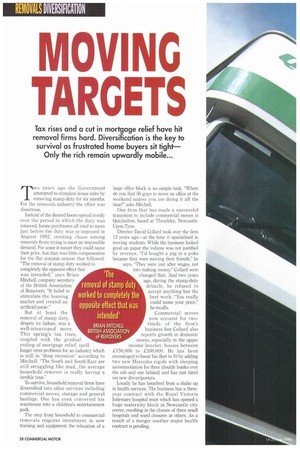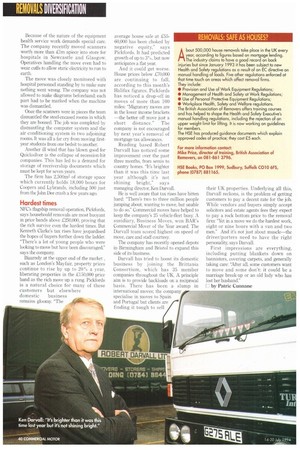MOVING TARGETS
Page 40

Page 42

If you've noticed an error in this article please click here to report it so we can fix it.
Tax rises and a cut in mortgage relief have hit removal firms hard. Diversification is the key to survival as frustrated home buyers sit tight— Only the rich remain upwardly mobile...
Two years ago the Government attempted to stimulate house sales by removing stamp duty for six months. For the removals industry the effect was disastrous.
Instead of the desired boom spread evenly over the period in which the duty was removed, house purchasers all tried to move just before the duty was re-imposed in August 1992, creating chaos among removals firms trying to meet an impossible demand. For some it meant they could name their price, but that was little compensation for the flat autumn season that followed. "The removal of stamp duty worked to completely the opposite effect that was intended," says Brian Mitchell, company secretary of the British Association of Removers. "It failed to stimulate the housing market and created an artificial panic."
But at least the removal of stamp duty, despite its failure, was a well-intentioned move. This spring's tax rises, coupled with the gradual ending of mortgage relief, spell longer term problems for an industry which is still in "deep recession" according to Mitchell: "The South and South-East are still struggling like mad...the average household remover is really having a terrible time."
To survive, household removal firms have diversified into other services including commercial moves, storage and general haulage. One has even converted his warehouse into a children's entertainment park.
The step from household to commercial removals requires investment in new training and equipment; the relocation of a large office block is no simple task. "Where do you find 50 guys to move an office at the weekend unless you are doing it all the time?" asks Mitchell.
One firm that has made a successful transition to include commercial moves is Quicksilver, based at Throckley, NewcastleUpon-Tyne.
Director David Collard took over the firm 12 years ago—at the time it specialised in moving students. While the business looked good on paper the volume was not justified by revenue. "I'd bought a pig in a poke because they were moving their friends," he says. "They were just after wages, not into making money." Collard soon changed that. And two years ago, during the stamp-duty debacle, he refused to accept anything but the best work: "You really could name your price," he recalls.
Commercial moves now account for twothirds of the firm's business but Collard also reports growth in domestic moves, especially in the upper income bracket: houses between £150,000 to £200,000. He has been encouraged to boost his fleet to 10 by adding two new Mercedes rigids with sleeping accommodation for three (double bunks over the cab and one behind) and has just hired six new driver/porters.
Locally he has benefited from a shake up in health services. The business has a threeyear contract with the Royal Victoria Infirmary hospital trust which has opened a huge maternity block in Newcastle city centre, resulting in the closure of three small hospitals and ward closures at others. As a result of a merger another major health contract is pending. Because of the nature of the equipment health service work demands special care. The company recently moved scanners worth more than £1m apiece into store for hospitals in Newcastle and Glasgow. Operatives handling the move even had to wear cuffs to allow static electricity to run to earth.
The move was closely monitored with hospital personnel standing by to make sure nothing went wrong. The company was not allowed to make diagrams beforehand; each part had to be marked when the machine was dismantled.
Once the scanners were in pieces the team dismantled the steel-encased rooms in which they are housed. The job was completed by dismantling the computer system and the air conditioning system in two adjoining rooms. It was all a far cry from moving firstyear students from one bedsit to another.
Another ill wind that has blown good for Quicksilver is the collapse of recession-hit companies. This has led to a demand for storage of receivership documents which must be kept for seven years.
The firm has 2,500m2 of storage space which currently holds 18,000 boxes for Coopers and Lybrands, including 500 just from the John Dee crash a few years ago.
Hardest times
NFC's flagship removal operation, Pickfords, says househould removals are most buoyant in price bands above /250,000, proving that the rich survive even the hardest times. But Kenneth Clarke's tax rises have jeopardised the hopes of buyers further down the ladder. "There's a lot of young people who were looking to move but have been discouraged," says the company.
Bizarrely at the upper end of the market, such as London's Mayfair, property prices continue to rise by up to 20% a year. liberating properties in the £150,000 price band as the rich move up a rung. Pickfords is a natural choice for many of these customers but elsewhere domestic business remains gloomy. "The average house sale at £5560,000 has been choked by negative equity," says Pickfords. It had predicted growth of up to 3%, but now anticipates a flat year.
And it could get worse. House prices below £70,000 are continuing to fall, according to this month's Halifax figures. Pickfords has noticed a drop-off in moves of more than 100 miles: "Migratory moves are in the lower income brackets —the better off move just a short distance." The company is not encouraged by next year's removal of mortgage tax allowances.
Reading based Robert Darya]] has noticed some improvement over the past three months, from semis to country homes. "It's brighter than it was this time last year although it's not shining bright," says managing director, Ken Darvall.
He is well aware that tax rises have bitten hard: "There's two to three million people jumping about, wanting to move, but unable to do so." Commercial moves have helped to keep the company's 25 vehicle-fleet busy. A susidiary, Business Moves, won BAR's Commercial Mover of the Year award. The Darvall team scored highest on speed of move, care and staff courtesy.
The company has recently opened depots in Birmingham and Bristol to expand this side of its business.
Darvall has tried to boost its domestic business by joining the Brittania Consortium, which has 35 member companies throughout the UK. A principle aim is to provide backloads on a reciprocal basis. There has been a slump in international moves; the company specialise in moves to Spain and Portugal but clients are finding it tough to sell
their UK properties. Underlying all this, Darvall reckons, is the problem of getting customers to pay a decent rate for the job. While vendors and buyers simply accept solicitors and estate agents fees they expect to pay a rock bottom price to the removal firm: "Yet in a move we do the hardest work, eight or nine hours with a van and two men." And it's not just about muscle—the driver/porters need to have the right personality, says Duvall.
First impressions are everything, including putting blankets down on bannisters, covering carpets, and generally taking care: "After all, some customers want to move and some don't: it could be a marriage break-up or an old lady who has lost her husband."
Fl by Patric Cunnane




























































































